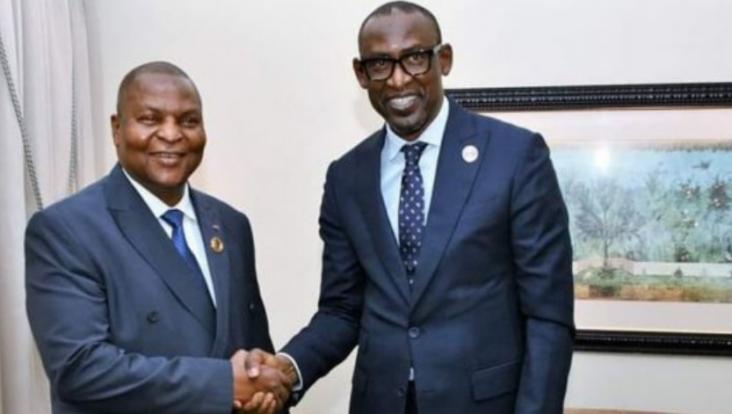Africa-Press – Eswatini. On the sidelines of the official programme, the AU’s major meetings are often dominated by intense lobbying. In Addis Ababa, on 5 and 6 February, an increasing number of informal meetings were held.
Russia’s deputy foreign affairs minister Mikhail Bogdanov took advantage of being in Addis Ababa to push Moscow’s bid for the 2030 World Expo. He held numerous meetings with several heads of state: Ismaïl Omar Guelleh (Djibouti), Denis Sassou Nguesso (Republic of Congo), Faustin-Archange Touadéra (CAR), Emmerson Mnangagwa (Zimbabwe), Somalia’s Mohamed Abdullahi Mohamed (aka Farmajo) and Mohammed el-Menfi (head of the Conseil Présidentiel Libyen).
He also discussed this subject with Sameh Shukri, Egypt’s foreign affairs minister, who had been sent there by President Abdel Fattah al-Sissi. The Marshal-President attended the opening ceremony of the Olympic Games in Beijing, in the presence of Vladimir Putin.
ICC-Africa cooperation
Prosecutor of the International Criminal Court (ICC) since June 2021, Karim Khan had not yet met Africa’s presidents. Also invited by the AU, he used this opportunity to introduce himself and discuss cooperation with Félix Tshisekedi (DRC), Alassane Ouattara (Côte d’Ivoire) and Mohamed Bazoum (Niger) – with whom he discussed the possibility of judging jihadists before the ICC.
He also exchanged views with Touadéra, as several cases of ex-Séléka members are being processed in The Hague and the proceedings of Joseph Kony (still under an international arrest warrant) and the LRA (Armée de Résistance du Seigneur), whose rear base is partly based in the CAR, resurface.
On the sidelines of the official programme, the AU’s major meetings are often dominated by intense lobbying. In Addis Ababa, on 5 and 6 February, an increasing number of informal meetings were held.
Russia’s deputy foreign affairs minister Mikhail Bogdanov took advantage of being in Addis Ababa to push Moscow’s bid for the 2030 World Expo. He held numerous meetings with several heads of state: Ismaïl Omar Guelleh (Djibouti), Denis Sassou Nguesso (Republic of Congo), Faustin-Archange Touadéra (CAR), Emmerson Mnangagwa (Zimbabwe), Somalia’s Mohamed Abdullahi Mohamed (aka Farmajo) and Mohammed el-Menfi (head of the Conseil Présidentiel Libyen).
He also discussed this subject with Sameh Shukri, Egypt’s foreign affairs minister, who had been sent there by President Abdel Fattah al-Sissi. The Marshal-President attended the opening ceremony of the Olympic Games in Beijing, in the presence of Vladimir Putin.
ICC-Africa cooperation
Prosecutor of the International Criminal Court (ICC) since June 2021, Karim Khan had not yet met Africa’s presidents. Also invited by the AU, he used this opportunity to introduce himself and discuss cooperation with Félix Tshisekedi (DRC), Alassane Ouattara (Côte d’Ivoire) and Mohamed Bazoum (Niger) – with whom he discussed the possibility of judging jihadists before the ICC.
He also exchanged views with Touadéra, as several cases of ex-Séléka members are being processed in The Hague and the proceedings of Joseph Kony (still under an international arrest warrant) and the LRA (Armée de Résistance du Seigneur), whose rear base is partly based in the CAR, resurface.
Khan also met with Chad’s prime minister Albert Pahimi Padacké, as well as Rwanda’s foreign affairs minister Vincent Biruta and his South African counterpart, Naledi Pandor.
AfCFTA and infrastructure
In Addis Ababa, African presidents advocated for their own issues. Bazoum got confirmation that an extraordinary summit of African heads of state on industrialisation and economic diversification will be held in Niger from 20 to 25 November 2022.
The idea is also to make the most of the infrastructure in Niamey (Radisson Blu Hotel and Mahatma Gandhi International Conference Centre), which is managed by the Agence Nationale de l’Economie des Conférences and headed by Mohamed Saidil Moctar, the presidency’s minister adviser. With a view to organising this event, the Nigerian President held talks in Addis Ababa with representatives from several organisations: Vera Songwe, the Economic Commission for Africa’s executive secretary, and Ibrahim Mayaki, the executive director of the New Partnership for Africa’s Development (NEPAD).
Bazoum is also counting on the AfCFTA, whose secretary-general, Wamkele Mene, he met in Niamey. Present as a guest and president of his foundation, Mahamadou Issoufou also presented a progress report on this dossier, on which he had focused most of his time towards the end of his term in office.
In parallel with his bilateral meetings with his counterparts (Ouattara, Tshisekedi, etc.), Nguesso discussed with Gilberto Verissimo, president of the ECCAS Commission, his desire to develop sub-regional infrastructure.
Transitional governments in search of support
Finally, representatives from African transitional governments tried to obtain support. Padacké sought to reassure sceptics and explain that the national dialogue, initially scheduled for 15 February, had been postponed to 10 May. He reaffirmed that President Mahamat Idriss Déby would respect the presidential election calendar.
Although Mali has been heavily sanctioned by ECOWAS, Mali’s foreign affairs minister Abdoulaye Diop met with both Shirley Ayorkor Botchwey, Ghana’s head of diplomacy, its president, Nana Akufo-Addo, who chairs the sub-regional organisation, and Rwanda’s Vincent Biruta. As Presidents Faure Essozimna Gnassingbé and Assimi Goïta have good relations, Diop also met with his Togolese counterpart, Robert Dussey. Finally, Touadéra expressed his “solidarity” with him, to prove that they are united on the Russian front.
For More News And Analysis About Eswatini Follow Africa-Press







